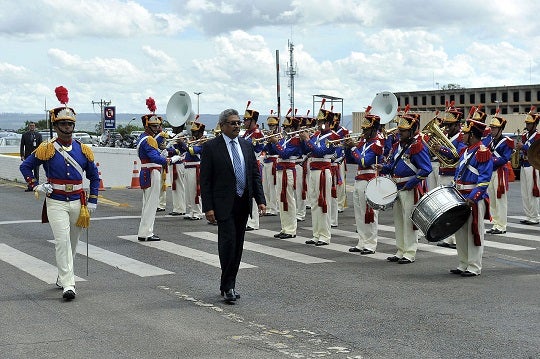Sri Lanka’s Presidential Election 2019: Singapore-Sri Lanka Relations under Gotabaya Rajapaksa
Roshni Kapur, Chulanee Attanayake
3 December 2019Summary
Since their independence, Singapore and Sri Lanka have been enjoying cordial socio-economic and diplomatic relations. However, their ties have been put to the test in the last two years, particularly following the stalling of their free trade agreement. This paper looks at the possibility of a revival of the agreement under Sri Lanka’s new president, Gotabaya Rajapaksa.
Introduction
The growing bilateral trade and economic relations between the island states of Sri Lanka and Singapore led to the signing of the Sri Lanka-Singapore Free Trade Agreement in January 2018. Both have traditionally enjoyed cordial relations with each other. Unfortunately, the agreement fell victim to the political contestation between then-President Maithripala Sirisena and thenPrime Minister Ranil Wickremesinghe. It has since been put on the back-burner.
Singapore-Sri Lanka Free Trade Agreement
Singapore’s imports from Sri Lanka currently stand at S$178 million while Singapore’s exports to Sri Lanka are worth S$2.5 billion. Bilateral trade between Singapore and Sri Lanka grew at an average rate of seven per cent annually from 2005 to 2015. In an attempt to deepen economic relations, Singapore and Colombo signed the Sri Lanka-Singapore Free Trade Agreement (SLSFTA) on 23 January 2018. Among others, the agreement was expected to provide greater access for Singapore companies to the Sri Lankan market.
The signing of the SLSFTA demonstrated Singapore’s recognition of Sri Lanka’s potential to be a major trading hub in the region, and its interest in searching for new partners. For Sri Lanka, the agreement was reflective of its post-civil war trade policies, which included boosting trade relations with Southeast Asia. However, the implementation of the agreement has been halted due to public opposition in Sri Lanka. The Sri Lanka parliament held a debate on the SLSFTA in July 2018 and it met with stiff resistance from the joint opposition, which questioned the legitimacy of the agreement. Some professional bodies in Sri Lanka also criticised the government for signing the agreement without consulting them. After appointing a Presidential Committee to study the agreement and its impact on Sri Lanka, Sirisena claimed that the “…agreement has been rushed without consent of stakeholder institutions” and stated that it required a revision. While Sri Lanka’s position on the FTA highlights the deep divisions domestically, the saga has adversely affected the Singapore business community’s confidence in Sri Lanka.
Possibility for Moving Forward
Gotabaya’s election as president may offer some hope for Singapore to revive the agreement and take the relationship forward.
The Sri Lanka Podujana Peramuna Party, which Gotabaya represents, is ideologically centred on nationalism and protectionism and is inward-oriented, compared to its predecessor, the United National Party. However, Gotabaya has positioned himself to follow a policy of harnessing new technologies to increase value additions in exports and manufacturing, a knowledge-based and technology-based economy, development of the private sector and small-medium enterprises, and encouraging greater investments.
In his election manifesto, Gotabaya stated that his government will strive to develop trade relations with multiple Southeast Asian countries, including Singapore. During his visit to India at the end of November 2019, Gotabaya made the call for investments from among others, Singapore, when he was interviewed by The Hindu, in relation to Sri Lanka’s over-reliance on China’s Belt and Road Initiative, “I want to tell India, Japan, Singapore, Australia and other countries to also come and invest in us. They should tell their companies to invest in Sri Lanka and help us grow, because if they do not, then not only Sri Lanka, but countries all over Asia will have the same [problem]. The Chinese will take the Belt and Road Initiative all over unless countries provide an alternative.”
While Gotabaya strongly believes that economic development is the solution to the economic woes of the country, he has also indicated that his government will “re-examine” all bilateral trade agreements signed in the past five years, and that if there are any provisions which are not favourable to Sri Lanka, they will be removed after talks with the respective countries. Moreover, he recently said that he wants to re-negotiate the Hambantota agreement with China and reach a better deal for Colombo. He could hold a similar view on the agreement with Singapore.
Conclusion
The new government in Colombo is likely to take a measured approach to trade and economic relations with other states. While Gotabaya realises the importance of an open and welcoming posture in helping to address his country’s economic woes, he would be mindful of his electorate promises not to compromise on national sovereignty at the expense of “harmful agreements/treaties”. At this point in time, the future of the SLSFTA remains uncertain. Much will depend on the Gotabaya government’s own assessment of the mutual benefits of the agreement. It will also ultimately depend on Gotabaya’s ability to convince the other stakeholders, including the joint opposition of which he was a part, of the same.
….
Ms Roshni Kapur is a Research Analyst at the Institute of South Asian Studies (ISAS), an autonomous research institute at the National University of Singapore (NUS). She can be contacted at roshni@nus.edu.sg. Dr Chulanee Attanayake is a Visiting Research Fellow at the same institute. She can be contacted at chulanee@nus.edu.sg. The authors bear full responsibility for the facts cited and opinions expressed in this paper.
-
 More From :
More From :
-
 Tags :
Tags :
-
 Download PDF
Download PDF



